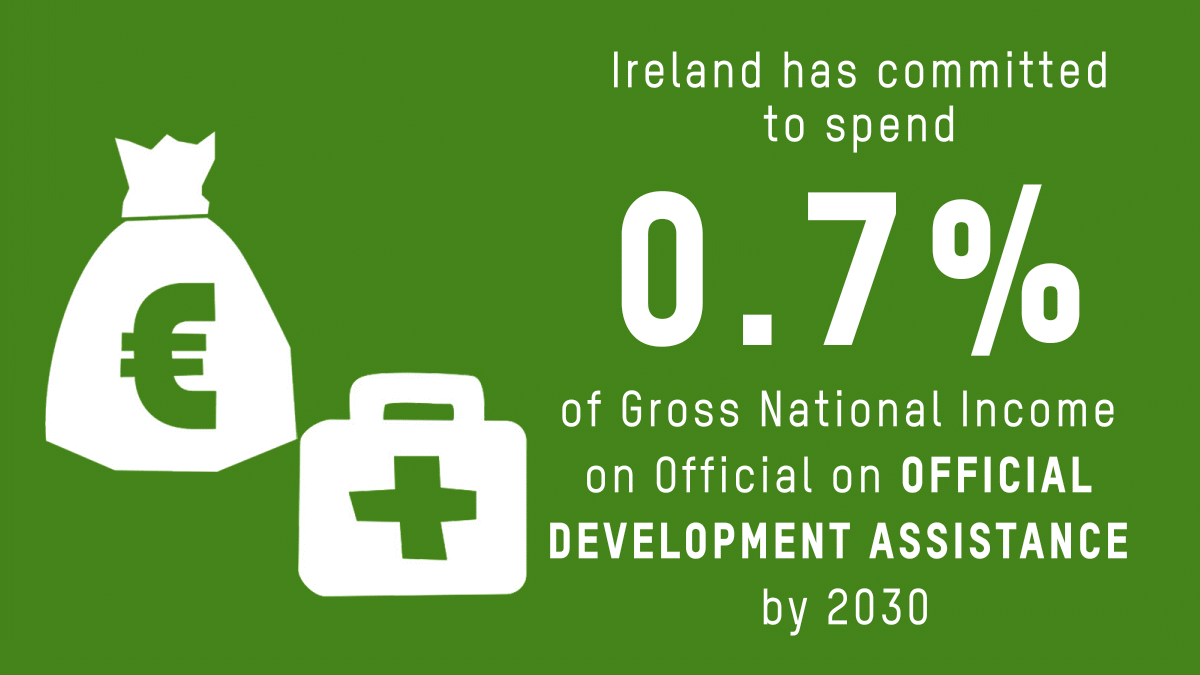- 4 min read
- Published: 31st August 2022
Budget 2023 needs to prioritise official development assistance

Budget 2023 is an opportunity for Ireland to build on the solidarity it has already shown with the world’s poorest and most vulnerable people struggling through the triple crises of Covid 19, Climate breakdown and Conflict. Upholding Ireland’s strong reputation and credibility as a leader on international development depends on its continued support for Official Development Assistance and advocacy for policies to improve the lives of people living in, or those vulnerable to, poverty, inequality and crisis.
While we are all familiar with the enormous challenges faced by Ireland in response to the triple challenges of Covid, Conflict and Climate, the situation in low-income countries is even more daunting. West Africa is currently facing its worst food crisis in a decade, with 27 million people going hungry. This number could rise to 38 million – an unprecedented level – unless urgent action is taken. In East Africa, one person is estimated to be dying of hunger every 48 seconds in drought-ravaged Ethiopia, Kenya and Somalia, as actions have remained too slow and too limited to prevent the hunger crisis from escalating. The rainfall deficit in the most recent rainy season in these three countries has been the most severe in at least 70 years.
In Yemen and Syria, protracted conflicts have shattered people’s livelihoods. In Yemen, more than 17 million people – over half of the population – don’t have enough food, and pockets of the country are experiencing famine-like conditions. In Syria, six out of 10 Syrians – 12.4 million people – are struggling to put food on the table. This means many families are resorting to extreme measures to cope: going into debt to buy food, taking children out of school to work, and reducing the number of meals they have each day. Marrying off young daughters so there is one less mouth to feed has become another shocking strategy families are using to survive.
The Programme for Government pledges to increase Ireland’s official aid budget to 0.7 percent of national income in line with international commitments by 2030. In 2022, despite a monetary increase in the ODA budget of €176m on the 2021 allocation, Ireland’s spending on ODA remained at 0.32% of GNI. In 2021, fourteen OECD DAC countries spent more in percentage terms and eighteen OECD DAC countries spent more in monetary terms. According to Dóchas estimates, Ireland needs to increase its ODA budget in Budget 2023 by €233m, and by similar annual amounts every year to ensure Ireland reaches the target of 0.7% over the course of the next seven years.
In addition to quantity, the quality of aid is key. Ireland has been recognised internationally as a donor that provides effective aid. The policy of providing untied aid and compliance with the Busan aid principles and principles of Good Humanitarian Donorship must be maintained. Ireland’s aid should continue to be used for its intended purpose to save lives, alleviate poverty and reduce vulnerability. Irish Aid’s effective aid approach can be bolstered by committing to implement the recommendations of the OECD’s Development Assistance Committee review of Irish Aid, in full.
Ireland must also advocate for the protection and integrity of aid in multilateral instruments, particularly as part of Ireland’s contribution to the EU’s development budget, as the total Irish contribution to EU ODA in 2020 amounted to over €230 million, around a quarter of Ireland’s ODA. Particular attention should be paid to potential contributions to EU ‘migration control’ projects that negatively impact human rights and run counter to Irish Aid’s aims and Policy Coherence for Development as set out in the Lisbon Treaty. Also, as Ireland ramps up funding for climate finance to ensure that nations most impacted by climate breakdown have adequate resources to implement necessary adaption and mitigation measures, we need to ensure that such funding is reaching those most in need on the ground, especially female farmers working on small farms.
- Increase Ireland’s ODA budget in Budget 2023 by €233m, so it can play its part in responding to these urgent global needs and setting it on a path to reach the target of 0.7% of GNI spent on ODA over the course of the next seven years.
- Maintain the integrity of ODA: Maintain Ireland’s commitment to development effectiveness by implementing the recommendations of the OECD DAC review of Ireland’s ODA programme, in full. This should include developing a clear policy on private sector engagement and a policy coherence mechanism, as well as enhancing civil societies’ role in the delivery of Ireland’s ODA.
- Advocate for the protection and integrity of aid in multilateral instruments especially related to ‘migration control’ and climate finance.
For more details of how Budget 2023 can contribute to addressing inequality, ending poverty and creating a more sustainable world please see our pre-budget submission.
